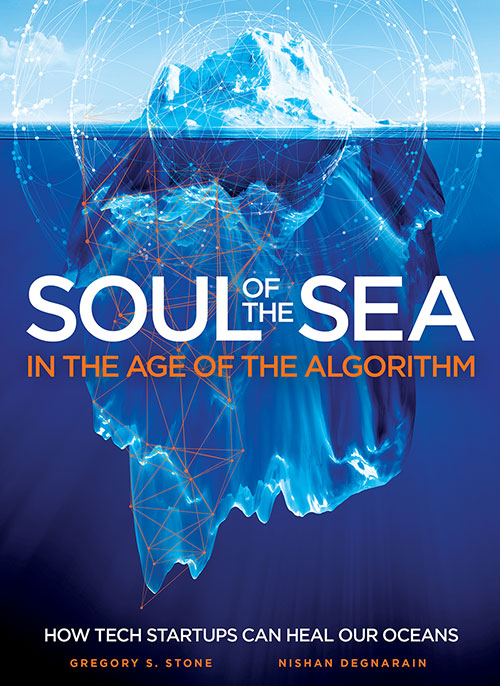Soul of the Sea In the Age of the Algorithm
 At the UN Ocean Conference in New York this June, a copy of a new book – SOUL OF THE SEA IN THE AGE OF THE ALGORITHM, How Tech Start-Ups Can Heal Our Oceans – was presented to each attending delegation by General Assembly President, Peter Thomson, who in his Introduction, describes the ocean challenge as follows:
At the UN Ocean Conference in New York this June, a copy of a new book – SOUL OF THE SEA IN THE AGE OF THE ALGORITHM, How Tech Start-Ups Can Heal Our Oceans – was presented to each attending delegation by General Assembly President, Peter Thomson, who in his Introduction, describes the ocean challenge as follows:
“Our next challenge lies in formulating and applying effective, holistic solutions that can adapt themselves to the task as it evolves. The same power we wield to exploit and modify our world can be used to solve the problems we created along the way. The solutions we looking for are not simply an extension or fine=tuning of the traditional ideas, tools, technologies, and ways of thinking surrounding traditional resource conservation management…Static, linear solutions for a dynamic, non-linear system will not work...Our economic systems, our governance, our environmental interventions must be rethought, reorganized, and retooled. We need radically new ways of thinking and behaving.”

The authors of SOUL OF THE SEA are Dr. Gregory S. Stone, Executive Vice President for Oceans at Conservation International, an ocean scientist, diver, and explorer, advocate implementer of novel projects in marine protected areas, aquaculture, the ocean health index, climate adaptation, and deep seamount environment, and prolific author with a fulsome catalogue of publications in marine science, marine policy, and human ecology; and Nishan Degnarain, co-leader with Dr. Stone of the World Economic Forum Special Initiative on Oceans, chair of the Forum’s Global Agenda Council on Oceans, economist with the World Bank on UN Sustainable Development Goal for Oceans and new models for ocean-related economic growth in emerging markets, and advisor to leading technology companies in the fields of artificial intelligence, big data, satellite technology, autonomous vessels, and bio-technology. The authors are an extraordinary complementary team – in age, experience, and understanding of the “radically new ways of thinking and behaving” that Ambassador Thomson asserts as the requirement for the benefit of the future ocean and its essential contribution to our global future.
The book surveys the evolution of ocean exploration and exploitation through three definable “revolutions” or phases of global change by the cause and effect of population growth, mass production, global consumption, science and technology, and augmentation of computerization, miniaturization, and unpredictable financial and geo-political events. The focus, however, is on solutions for the ocean in the context of a “fourth industrial revolution,” characterized by a range of astonishing new technologies that “are fusing the physical, digital, and biological worlds, impacting all disciplines, economies, and industries, and even challenging ideas about what it means to be human.” The book examines these new platforms and explores their implication for a new economics, a new politics, and a new social contract.
The authors see the ocean as “a springboard for ocean innovation” where big data creates a digital avatar of our ocean that creates models and trials by which to test ideas through simulation, projected outcomes, and risk management: autonomous vessels for exploration, transportation, and trade; a new approach to aquaculture to feed burgeoning population, marine biological engineering, deep-ocean energy, and many other new methods for engaging the ocean responsibly, ethically, and sustainably for human purpose and global health.
Ultimately the authors see our time as a “leadership moment,” when stresses must be addressed by innovation in the form of a next generation of leaders and organizations; instrumentation and metrics; core communities, crowd engagement, and distributed trust; augmented ocean monitoring systems; trained staff on demand for anticipated, planned response; assets leveraged efficiently multiple uses; and new, transparent communications to build a more vital integrated and international ocean constituency.

What is the framework in which all this can happen? Here are some suggested premises:
- A healthy ocean delivers vital benefits to people.
- All decisions we make and actions we take must not impinge on those benefits.
- The benefits resulting from Ocean Equity, whether financial, spiritual, or otherwise are equally shared.
- We adopt the principle of Seven Generation Stewardship, the assumption that every decision is to be taken in the context of long-term generational continuity and sustainability.
- We must restore natural capital and ensure that we live off the interest alone.
Each of these will be a challenge, confronted with the intent, as defined by Buckminster Fuller, to “make the world work, for 100% of humanity, in the shortest possible time, through spontaneous cooperation, without ecological offense or the disadvantage of anyone.”
SOUL OF THE SEA is the second volume in a series of provocative, transformational publications about the ocean released by the World Ocean Observatory. To pre-order your copy, contact your local independent bookstore or visit amazon.com.
- - -
Soul of the Sea first appeared as a 5-minute audio episode on World Ocean Radio. Learn more at /World-Ocean-Radio.
- Login to post comments
-


